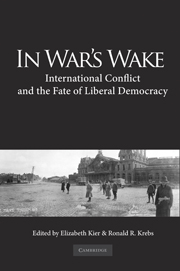Book contents
- Frontmatter
- Contents
- List of Contributors
- Acknowledgments
- 1 Introduction
- PART I WAR AND DEMOCRATIC TRANSITIONS: NEW AND DURABLE DEMOCRACIES?
- 2 Does War Influence Democratization?
- 3 Dodging a Bullet
- 4 Armed Conflict and the Durability of Electoral Democracy
- PART II WAR AND DEMOCRATIC PUBLICS: RESHAPING POLITICAL PARTICIPATION?
- PART III WAR AND DEMOCRATIC STATES: GOVERNMENT BY THE PEOPLE OR OVER THE PEOPLE?
- References
- Index
3 - Dodging a Bullet
Democracy's Gains in Modern War
Published online by Cambridge University Press: 05 June 2012
- Frontmatter
- Contents
- List of Contributors
- Acknowledgments
- 1 Introduction
- PART I WAR AND DEMOCRATIC TRANSITIONS: NEW AND DURABLE DEMOCRACIES?
- 2 Does War Influence Democratization?
- 3 Dodging a Bullet
- 4 Armed Conflict and the Durability of Electoral Democracy
- PART II WAR AND DEMOCRATIC PUBLICS: RESHAPING POLITICAL PARTICIPATION?
- PART III WAR AND DEMOCRATIC STATES: GOVERNMENT BY THE PEOPLE OR OVER THE PEOPLE?
- References
- Index
Summary
That war drives state-building is virtually a truism of historical sociology, summed up in the late Charles Tilly's well-known aphorism that states make war, and war makes states. But if war and state-building merely reinforce each other, why have liberal democracies flourished and proliferated during the past two centuries when war reached unprecedented dimensions? Why not militaristic autocracies? What role, if any, has war played in the formation and spread of liberal-democratic regimes?
To raise these questions is not to suggest that war is one of democracy's primary causes, but rather to ask how democracy and, more particularly, liberal democracy dodged a bullet – a bullet that, according to many ancient and plausible theories, might well have been fatal. The belief that democracy is a liability in war has been a staple of political thought, beginning with Thucydides. If liberalism and democracy had been sources of severe military disadvantage during the past two centuries, liberal-democratic regimes should have perished in wars as they were conquered and eliminated by other states, or when their own populations rose up to overthrow them in the wake of defeat, or because they were forced to abandon their institutions in order to survive. That this was not their fate suggests a range of possibilities. At a minimum, their institutions have not been a disabling handicap in war, and no consistent relationship may exist between war and democracy.
- Type
- Chapter
- Information
- In War’s WakeInternational Conflict and the Fate of Liberal Democracy, pp. 50 - 66Publisher: Cambridge University PressPrint publication year: 2010
- 10
- Cited by

